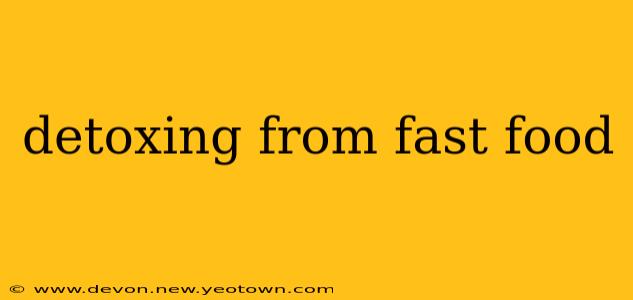Fast food. The siren song of convenience, beckoning with its salty fries and sugary sodas. We've all been there, seduced by its accessibility and speed. But after a period of indulgence, many of us find ourselves craving a healthier lifestyle, looking to detox from fast food's grip. This isn't about some drastic cleanse; it's about a gentle, mindful transition back to nourishing your body with wholesome goodness. Let's embark on this journey together.
My name is Sarah, and I've been there. Years of late nights and quick meals left me feeling sluggish, bloated, and frankly, pretty miserable. The journey to breaking free wasn't easy, but the rewards—increased energy, clearer skin, and a newfound sense of well-being—were absolutely worth it. This post shares my personal experiences and expert-backed advice to guide you through your own detox.
How Long Does it Take to Detox from Fast Food?
This is a question with no single answer. It depends entirely on your individual body, how long you've been consuming fast food, and the extent of your consumption. Some people notice improvements within a week, while others may need several weeks or even months to feel significantly better. The key is consistency and patience. Don't get discouraged if you don't see immediate results. Focus on making sustainable changes, and celebrate the small victories along the way.
What Happens When You Stop Eating Fast Food?
The positive changes can be dramatic. As your body adjusts to a diet richer in whole foods and lower in processed ingredients, you might experience:
- Increased Energy Levels: Fast food is often low in nutrients and high in refined sugars and unhealthy fats, leading to energy crashes. As you switch to healthier options, your energy levels will naturally stabilize.
- Improved Digestion: Fast food can wreak havoc on your gut. Eliminating it can lead to improved digestion, less bloating, and fewer digestive issues.
- Better Sleep: A diet filled with processed foods can interfere with sleep patterns. Nourishing your body with whole foods can promote more restful sleep.
- Clearer Skin: Many people report clearer skin after cutting out fast food, as it often contributes to inflammation and breakouts.
- Weight Management: Fast food is generally high in calories and low in nutrients, making it difficult to maintain a healthy weight. Switching to whole foods helps you feel fuller for longer, leading to better weight management.
What Are the Symptoms of Fast Food Withdrawal?
While not a "withdrawal" in the clinical sense like with drugs or alcohol, some people experience mild symptoms as their bodies adjust to a healthier diet. These might include:
- Headaches: This is often due to changes in caffeine or sugar intake.
- Fatigue: Your body may need time to adjust to a new nutritional profile.
- Irritability: This can be related to sugar withdrawal.
- Cravings: These are natural and temporary. Strategies to manage cravings are discussed below.
How to Detox from Fast Food: A Step-by-Step Guide
The key is gradual, sustainable change, not a radical overnight transformation. Here's a roadmap:
- Reduce Gradually: Don't try to eliminate fast food cold turkey. Start by reducing your consumption gradually, perhaps by replacing one fast food meal per week with a healthier alternative.
- Focus on Whole Foods: Fill your plate with fruits, vegetables, lean proteins, and whole grains.
- Hydrate: Drink plenty of water to flush out toxins and support your body's natural cleansing processes.
- Listen to Your Body: Pay attention to how different foods make you feel.
- Plan Ahead: Prepare healthy meals and snacks in advance to avoid impulsive fast food choices.
- Find Healthy Alternatives: Explore healthier versions of your favorite fast food items. For example, bake sweet potato fries instead of ordering the greasy kind.
- Manage Cravings: When cravings strike, try distracting yourself, drinking water, or having a healthy snack.
What Foods Should I Eat When Detoxing?
Focus on nutrient-dense foods that support your body's natural detoxification processes:
- Leafy Greens: Spinach, kale, and romaine lettuce are packed with vitamins and minerals.
- Cruciferous Vegetables: Broccoli, cauliflower, and Brussels sprouts support liver function.
- Berries: Blueberries, strawberries, and raspberries are rich in antioxidants.
- Lean Protein: Chicken, fish, beans, and lentils provide essential amino acids.
- Whole Grains: Brown rice, quinoa, and oats offer sustained energy.
Is it Necessary to Detox from Fast Food?
While the term "detox" is often used loosely, shifting away from a diet high in processed foods and towards nutrient-rich whole foods is beneficial for almost everyone. It's not necessarily a "detox," but rather a transition to a healthier lifestyle.
This journey is personal. Be patient with yourself, celebrate your progress, and remember that lasting change comes from sustainable habits. Your body will thank you for it.

